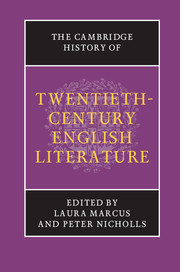Book contents
- Frontmatter
- Introduction
- PART ONE WRITING MODERNITY
- 1 Science and knowledge at the beginning of the twentieth century: versions of the modern Enlightenment
- 2 The Victorian fin de siècle and Decadence
- 3 Empire and modern writing
- 4 The gender of modernity
- PART TWO THE EMERGING AVANT-GARDE
- PART THREE MODERNISM AND ITS AFTERMATH, 1918–1945
- PART FOUR POST-WAR CULTURES, 1945–1970
- PART FIVE TOWARDS THE MILLENNIUM, 1970–2000
- Bibliography
- Index
- References
1 - Science and knowledge at the beginning of the twentieth century: versions of the modern Enlightenment
from PART ONE - WRITING MODERNITY
Published online by Cambridge University Press: 28 March 2008
- Frontmatter
- Introduction
- PART ONE WRITING MODERNITY
- 1 Science and knowledge at the beginning of the twentieth century: versions of the modern Enlightenment
- 2 The Victorian fin de siècle and Decadence
- 3 Empire and modern writing
- 4 The gender of modernity
- PART TWO THE EMERGING AVANT-GARDE
- PART THREE MODERNISM AND ITS AFTERMATH, 1918–1945
- PART FOUR POST-WAR CULTURES, 1945–1970
- PART FIVE TOWARDS THE MILLENNIUM, 1970–2000
- Bibliography
- Index
- References
Summary
Ursula Brangwen in the laboratory
In his multi-generational novel The Rainbow (1915), D. H. Lawrence shows his early twentieth-century heroine Ursula Brangwen as a biology student at Nottingham university college. During her final year of study Ursula has a conversation with a woman doctor of physics, Dr Frankstone, a materialist who believes that there is no special mystery to life. Life is simply a ‘complexity of physical and chemical activities, of the same order as the activities we already know in science’. As scientific research continues, there is no reason why we should not come to know everything. But the conversation ends on a note of uncertainty – Dr Frankstone is, after all, only restating the conventional outlook of nineteenth-century scientific Positivism – and Ursula, for one, is not convinced.
Positivism has been defined as ‘a collection of prohibitions concerning human knowledge, intended to confine the name “knowledge” or “science” to the results of those operations that are observable in the evolution of the modern sciences of nature’. There is, then, a distinct circularity involved in the claim that we can come to know everything through scientific research, since science itself has been allowed to prescribe what counts as knowledge. Dr Frankstone is speaking for the so-called ‘classical’ Victorian physics, which would be fundamentally challenged in the early twentieth century by Einsteinian relativity, quantum theory and Heisenberg’s Uncertainty Principle. Classical physics derives from Newton, but in the late nineteenth century its most influential figure was Lord Kelvin, whose Laws of Thermodynamics had led to a conception of the physical universe in which everything could be charted and everything was predictable.
- Type
- Chapter
- Information
- Publisher: Cambridge University PressPrint publication year: 2005

